仏の顔も三度とは?
「仏の顔も三度(ほとけのかおもさんど)」は、「どんなに寛大で穏やかな人でも、何度も無礼や失礼を受ければ、いずれ怒りを見せるようになる」という意味のことわざです。この表現には、度重なる無礼は慎むべきだという教訓が込められています。
このことわざの背景
仏(ほとけ)は一般に、慈悲深く穏やかで、他者を許し、怒りを示さない存在として考えられています。しかし、そのような仏であっても、何度もひどい扱いを受ければ怒ることがある、という比喩から「仏の顔も三度」という表現が生まれました。つまり、「慈悲の象徴である仏でさえ三度は許すが、四度目は許せない」という意味を持っており、度を過ぎた行為には限度があることを示しています。
この表現の使われ方
「仏の顔も三度」は、次のような場面で使われます。
寛大な態度にも限度があることを伝える場合
相手が他者の優しさに甘えすぎたり、何度も同じミスを繰り返したりする場合に、「仏の顔も三度だよ」と諭すように使います。これは、「他人の優しさや許しにも限界がある」ということを相手に知らせるためです。
度重なる失礼や無礼を慎むべきことを伝える場合
特に人間関係において、相手に対して失礼な行動や無礼を繰り返す人に対し、警告の意味で「仏の顔も三度」ということがあります。例えば、同じ行動で他者を傷つける人に対し、「いい加減にしないと仏の顔も三度だよ」と注意する場面で使われます。
怒りやすくない人が怒ったときの説明として
普段は穏やかで怒らない人が、何度も無礼を受けて怒ったときに「仏の顔も三度だね」と周りが驚く形で使うこともあります。これは、「あの人が怒るなんて、それだけの理由がある」という意味で使われます。
類似表現
堪忍袋の緒が切れる
我慢が限界に達し、ついに怒りが爆発することを意味します。
「水も滴り落ちれば石を穿つ」:繰り返しの行為が限界を超えて効果を持つようになることを表しますが、こちらは忍耐の限界とは異なり、積み重ねの影響を表現しています。
「仏の顔も三度」は、相手の寛大な態度に甘えすぎたり、同じ過ちを繰り返すことの危険性を指摘することわざです。慈悲深い仏でも限度があるように、他者の優しさや許しには限界があるため、その恩恵に甘え続けないように戒める意味を持っています。このことわざは、人間関係において礼儀を守り、他者の寛大さに頼りすぎないことの重要性を教えています。
The proverb “Hotoke-no-Kamo-sando” means, “Even the most generous and gentle person will eventually show his anger if he is repeatedly rude or disrespectful. This expression implies the lesson that repeated rudeness should be avoided.
Background of the Proverb
The Buddha is generally thought of as a compassionate and gentle being who forgives others and shows no anger. However, even such a Buddha can become angry if he is mistreated repeatedly, giving rise to the expression, “A Buddha only forgives three times. In other words, it means that even the Buddha, the symbol of mercy, can forgive three times, but not a fourth time, indicating that there is a limit to the extent of excessive behavior.How this expression is used
The phrase “A Buddha only forgives three times” is used in the following situations.When conveying that there is a limit to one’s generosity:
When the other person takes too much advantage of the kindness of others or makes the same mistake over and over again, it is used as an admonition, “Even the Buddha’s face is three times as big as your face. This is to let the other person know that there are limits to other people’s kindness and forgiveness.When telling someone that they should refrain from repeated rudeness or disrespect:
Especially in human relationships, “A Buddha only forgives three times” is used as a warning to those who repeatedly act rudely or disrespectfully toward the other person. For example, it is used in situations to warn people who hurt others with the same behavior, saying, “You’d better cut it out or you’ll have to face the Buddha three times.As an explanation for when someone who is not easily angered becomes angry:
When a normally calm and non-angry person becomes angry after being repeatedly disrespectful, it is sometimes used in a way that surprises those around him or her: “Buddha’s face is also three times as good as his face. This is used in the sense of “there is a good reason for that person to be angry.Similar expressions
Endure,” meaning that one’s patience has reached its limit and one’s anger is finally exploding.
Water, too, when it drips, pierces a stone”: describes a repeated act that has an effect beyond its limits, but this one is different from the limit of patience, expressing the effects of accumulation.Conclusion
The proverb “Buddha’s face is three times as good as his face” points out the danger of over-indulging in the generosity of others or repeating the same mistake over and over again. Just as even the benevolent Buddha has limits, there are limits to the kindness and forgiveness of others, and the proverb is meant to warn us not to continue to take advantage of them. This proverb teaches us the importance of being courteous in our relationships and not relying too much on the generosity of others.
AIが描いた「仏の顔も三度」
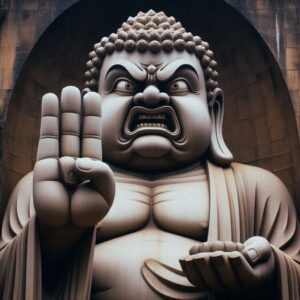

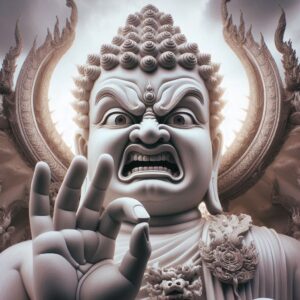
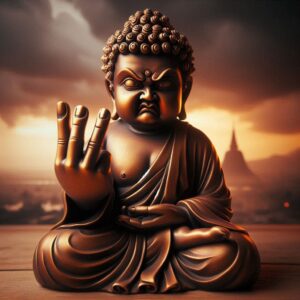
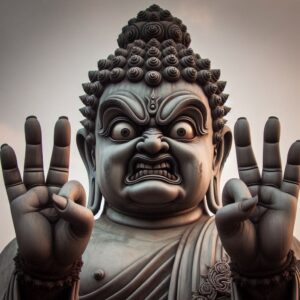
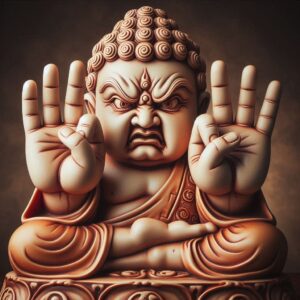
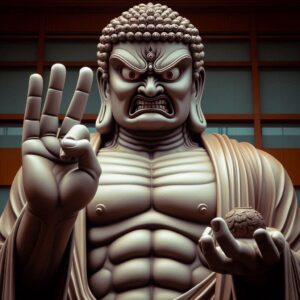
















コメント